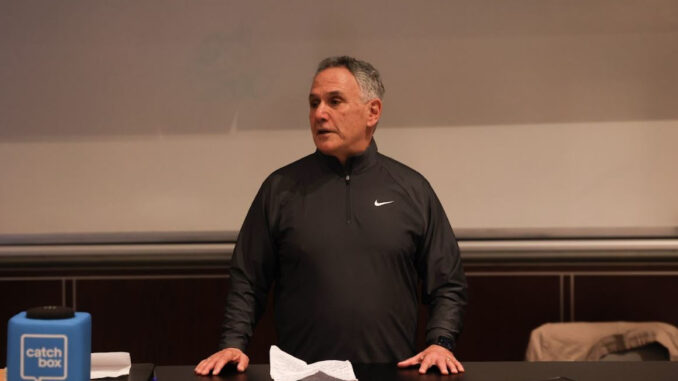
Kaitlyn Hughes | Staff Writer
Former Duquesne men’s basketball Head Coach Keith Dambrot never publicized that he was Jewish growing up because he thought it would hurt his career.
Now as he sees tourmoil in the Middle East and the targeting of Jewish students, he wants to share who he is.
“I think that the more people can understand each other the better off this country is going to be,” Dambrot said.
The coach spoke on Wednesday evening in the Bayer Learning Center Pappert Lecture Hall. He shared his experience as a Jewish individual, while adding in anecdotes from his career.
Paired with the speech was a Passover-friendly reception which served Kosher food.
The event was hosted by Duquesne’s Hillel Jewish Student Organization.
According to Hillel’s president, Mia Olenick, the mission of the group is about being all-inclusive at a Catholic university.
Dambrot emphasized this goal throughout his talk.
“I just want to try and make the students feel comfortable,” Dambrot told The Duke. “With the way the environment is right now it’s hard for those kids. I want to make them understand they have support at the university.”
Sid Dambrot, the coach’s father, was on the 1954 Duquesne basketball team that had two Jewish and three Black players on it.
The coach said that the university was progressive back then, and he believes the school will continue to be welcoming to all backgrounds and minorities going forward.
Dambrot wanted the audience to understand that he has experienced similar situations as they may be experiencing now.
“You have choices to make as to how you deal with the issues that are going to come forward,” Dambrot said to the audience.
The coach emphasized that the Jewish community must not forget where they came from.
He encouraged the members of Hillell to keep speaking out and motivate more students to join, Jewish or not.
The coach said that the Spiritan Mission of inclusion is perfect for the “trying times we are in right now.”
At the end of his talk, Liz McCallum faculty advisor of Hillel, presented Dambrot with a Yiddishe cup that was engraved with the Duquesne ‘D’ and Duquesne Hillel symbol.
Olenick said the goal of the event was to get people together and bring support to the Jewish students on campus.
She believes that bringing an influential person like Dambrot will draw in a bigger crowd that does not always recognize the religion.
“To understand that he is part of us as a whole, I am hoping it makes these students who are not sure what Judaism is take a step back and be like, ‘Oh, well if this awesome coach who is with LeBron James is Jewish then these other Jewish students are okay too,’” Olenick said.
Will Wible came to the event as a non-Jewish student.
He believes that the talk was something that was needed for Duquesne and Pittsburgh as a whole.
“I just think there are a lot of communities that need help,” Wible said. “I think that’s something that our city needs to be aware of and needs to take action for.”
Two Duquesne faculty members from the school of education, Karen Levitt and Kara McGoey, came to support Hillel.
The pair said that the Jewish community needs support more than ever during this time.
McGoey said that having non-Jewish students learn and support Judaism builds a sense of community.
“I think it’s important for people to say, ‘Oh I didn’t know that person was Jewish’ and to get a broader perspective on who they are and how they think and how students think about the Jewish community,” Levitt said. “Both from the outside looking in, but also from the inside looking out.”
Joel Bauman, the staff advisor of Hillel, said that the talk was educational in the sense of confidence. It helped Jewish students realize that it is okay to be who they are.
Bauman agreed with Dambrot that inclusivity is a core foundation of the Spiritan mission, making events similar to this one a key aspect on Duquesne’s campus.
“It’s important here because the university really wants to be seen and known as a welcoming community for obviously Catholic students, but also for non-Catholics,” Bauman said.
